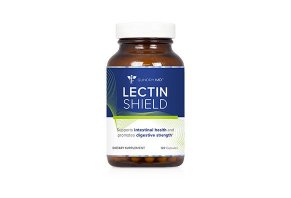What is Lectin Shield?
Gundry MD’s claims that their dietary supplement, Lectin Shield, will protect your body from lectin overload.
Lectins are proteins found in both animal and plant products, though they’re most abundant in legumes, fruits, vegetables, and grains. They play a role in many vital biological processes related to cell development and signaling, as well as your immune system.
So why limit their function?
Despite their importance, plant lectins may play a role in the development of conditions like food allergy, inflammatory bowel disease, insulin-dependent diabetes, and rheumatoid arthritis.
There has been discussion regarding meal plans that limit lectin intake, though these diets exclude many common foods and lack strong scientific support. Is there another option for those that wish to avoid the potential harm caused by lectins?
According to Gundry MD, taking two capsules of Lectin Shield twice daily should result in:
- Reduced appetite and food cravings
- Increased energy
- Better digestion and less “Leaky Gut”
- Cardiovascular support
- Improved immune system function
- Reduced Joint Pain
- Less Brain Fog
They claim that you’ll notice many of these results “within just a few days,” though the most “dramatic” results are likely to become apparent over the course of two to three weeks.
Can one supplement really offer so many benefits?
In this review, we’ll highlight the scientific support for the safety and efficacy of Lectin Shield to help you determine if this is the supplement you’ve been missing.
Who Is Dr. Steven Gundry? Does His Company Make Other Supplements?
Dr. Steven Gundry is a board-certified general surgeon and thoracic cardiovascular surgeon based out of Palm Springs, CA, where he founded The Center for Restorative Medicine Institute.
Here, Dr. Gundry promotes health through diet and lifestyle choices in hopes of helping his patients avoid the surgeries he has performed for over three decades. As he can only see so many patients on a daily basis, he founded Gundry MD to reach as many people as possible.
Dr. Gundry’s focus on diet-based health also lead him to write Dr. Gundry’s Diet Revolution: Turn Off the Genes That Are Killing You and Your Waistline, a three-phase plan that aims to help readers overcome obesity-related diseases.
Gundry MD currently offers over 30 dietary supplements, many of which have been previously reviewed on HighYa.
What Ingredients Are Found in Lectin Shield, and Do They Work?
Lectin Shield’s proposed benefits are thought to be related to its active ingredients. According to the product label, here’s what the supplement contains:
N Acetyl D-Glucosamine (NAG) - 300m
NAG is obtained from shellfish and thought to offer protection from the harmful effects of gluten, though there is minimal support for this, particularly in human subjects.
In a laboratory model, NAG offered protection from the toxic effects of rye, barley, and oat glutens in small intestinal cells obtained from 26 children with gluten intolerance.
Outside of this data, the literature is supporting the use of NAG in this setting is lacking.
Bladderwrack - 200mg
Bladderwrack is a fucose sugar-rich seaweed, also thought to offer protection from gluten.
In a rat study, 575 mg/kg/day of Bladderwrack over 2-weeks was not found to be beneficial as a dietary supplement for weight loss.
Its ability to bind lectins and limit their unwanted effects is unclear.
D-Mannose - 100mg
D-Mannose is a plant sugar that may block lectins, though this benefit has not been demonstrated in substantial scientific investigations with human subjects.
Mannose supplementation in mice on a high-fat diet improved endurance and glucose tolerance, while reducing body weight and body fat.
Okra Fruit - 100mg
Okra is thought to form a gel that can block lectins from attaching to your cells.
In a laboratory study, 0.2 to 2 mg/mL doses of okra extract inhibited the binding of bacteria to stomach cells. Okra may also offer heart health benefits through cholesterol-lowering actions, though this was demonstrated in mice.
Sialic Acid (Mucin) - 100mg
This protein is thought to reduce lectins’ ability to bind to the surface of your digestive tract through its ability to work on cell membranes.
Rats that were injected with 1mg of sialic acid per 50 g body weight for 7-days learned a maze quicker when compared to those treated with glucose.
The brain boosting effects, as well as the other proposed benefits of sialic acid supplementation, have not been demonstrated in human subjects.
Sodium Alginate (Alginic acid) - 100mg
Sodium alginate is thought to bind and remove lectins from your body.
Sodium alginate system formed a gel in the stomachs of rats that served to reduce food intake, body weight and peak blood glucose when compared to control. These findings highlight a potential benefit for supplementation in overweight and obese humans, though research is needed to investigate this possibility.
Vegetable Peptase - 50mg
This enzyme works to break down large protein molecules into smaller ones called peptides.
As this enzyme supports the digestion of the food we consume, supplementation should help avoid symptoms related to undigested food such as bloating, gas, heartburn, and lack of energy.
However, support for the use of vegetable peptidase in this regard is lacking.
Methylsulfonylmethane (MSM) - 50mg
MSM is a naturally occurring sulfur compound thought to offer anti-inflammatory and antioxidant benefits.
Treatment with 3g/day of MSM over 4-weeks in subjects completing resistance training improved blood tests that indicate antioxidant capacity, as well as exercise recovery.
When supplemented along with glucosamine, chondroitin sulfate, guava leaf extract, and vitamin D, 300 mg of MSM improved pain in patients with knee arthritis, though these results were not conclusive.
Larch Arabinogalactan - 50mg
Larch arabinogalactan is a complex carbohydrate from the larch tree (Larix occidentalis) thought to offer anti-microbial and immune boosting benefits.
Those randomized to 4.5g of an larch arabinogalactan had fewer colds over a 3-month span when compared to placebo.
With respect to anti-lectin activity, larch arabinogalactan did not limit lectin activity I a laboratory model.
Is Lectin Shield Safe?
In general, most of Lectin Shield’s ingredients should be well tolerated by most users, with the most common side effects being digestive upset and gassiness/bloating.
These ingredients lack substantial, long-term human studies that investigate various doses in different populations. As most of the available literature is in laboratory or animal models, it is challenging to confidently determine the safety of this product.
Of the ingredients included in Lectin Shield, MSM and larch arabinogalactan have been tested the most in humans. The Food and Drug Administration (FDA) consider MSM to be safe at dosages less than 4845.6 mg/day, while doses up to 4500 mg/day were safe in humans.
Additionally, due to the N Acetyl D-Glucosamine content, you should not take Lectin Shield if you’re allergic to shellfish.
It is safest to speak with your physician before use. Identifying the underlying source for any symptoms you may be experiencing is a good place to start on your road to management.
How Much Does Gundry MD Lectin Shield Cost?
Lectin Shield is available at Gundry MD’s site in the following quantities:
- 1 Bottle: $49.95 + $4.95 Shipping
- 3 Bottles: $131.85 + Free Shipping
- 6 Bottles: $239.70 + Free Shipping
All Gundry MD supplements (more about this next) come with a 90-day money back guarantee, less S&H charges.
In order to request a refund, you’ll need to call Gundry MD customer service at (800) 852-0477.
Lectin Shield is also available through Amazon at $54.25 per bottle. Shipping is currently free, though this supplement is not prime eligible.
Are There Any Alternatives to Lectin Shield?
There are a number of “Lectin Blockers” currently available from different vendors.
Lectin Guard from KaraMD offers a 30-day supply of their formulation for at $29.95 on Amazon. It has bladderwrack, okra fruit, and sodium alginate in common with Lectin Shield, and at comparable doses.
Lectin Lock from Stop Aging Now is yet another option that has an ingredient list almost identical to Lectin Shield, though they offer 400mg of N-Acetyl Glucosamine. They offer multi-bottle savings; 1 bottle/$29.95, 3 bottles/$80.85, and 6 bottles/$149.70.
Another option would be adopting a meal plan that limits lectin intake. Again, it can be challenging to hit daily nutrient requirements by omitting so many foods.
What Are Users Saying About Lectin Shield?
At 4.4 out of 5-stars on over 240 reviews, users seem to report favorable experiences with Lectin Shield.
Over 65% of reviewers rate this supplement at 5-stars. The most satisfied customers cited reduced gas, bloating, diarrhea, and constipation.
Those that rated Lectin Shield 3-stars or less made up about 8% of all reviewers. Unsatisfied customers mainly cited lack of results and expensive pricing for their negative experience, though others mentioned side effects such as diarrhea, constipation, and heartburn.
Gundry MD did seem responsive to those with negative experiences though representatives could do little more than offer a money-back guarantee or suggest seeing a physician.
Will Lectin Shield Provide “Comprehensive Anti-Lectin Health Support”?
Of the many reported benefits from the ingredients included in Lectin Shield, the proposed anti-lectin actions remain unclear. There simply isn’t much support for this action, and most of what the available research is laboratory or animal studies.
This makes determining efficacy challenging as results obtained from animal studies or laboratory models are not necessarily relatable to humans. Promising results in these investigations may highlight the need for more research, however, some of the studies we have reviewed here do not hint at the potential for some of the ingredients.
Also, the doses tested in animals and in the laboratory likely differ from what may be safe and effective in humans. It is therefore hard to draw conclusions from the available research regarding the safety of this supplement.
Though most ingredients are likely safe even at higher doses, be sure to speak to your physician first.
As this is a relatively expensive supplement, particularly if you plan to take it consistently, you may want to look elsewhere in light of the currently available scientific support.


